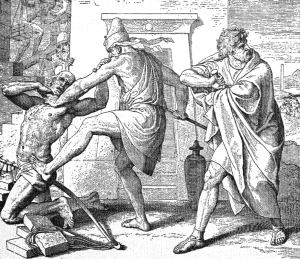 When Moses was grown up, his mother gave him back to the king's daughter. The princess took him to live with her in the palace, and loved him as her own son.
When Moses was grown up, his mother gave him back to the king's daughter. The princess took him to live with her in the palace, and loved him as her own son. When Moses was grown up, his mother gave him back to the king's daughter. The princess took him to live with her in the palace, and loved him as her own son.
When Moses was grown up, his mother gave him back to the king's daughter. The princess took him to live with her in the palace, and loved him as her own son.
"I will call him Moses," she decided, "for I drew him out of the water."
The lad grew up to be strong and good. Although he lived like a prince in the palace, he was not happy, because he was troubled by the sufferings of his people, the Israelites.
Moses was sorry for his people, whom the Egyptians treated cruelly. All kinds of burdens were laid on them. The Israelites had to do much heavy work, such as digging, and carrying great stones for the structures that the Egyptians built.
Day and night the Israelites had to work. They did not rest, however tired they might be, until their Egyptian masters gave them permission. Moses suffered to see his people placed under such cruel masters.
One day Moses saw an Egyptian strike one of the Israelite laborers. How angry Moses was! In his anger he struck down the Egyptian and killed him.
The king learned what Moses had done, and decided to put him to death. Afraid of the king's anger, Moses fled to a country called Madian.
One day Moses sat beside a well to rest. The seven daughters of a man called Jethro arrived to give their flocks drink. After a while some shepherds came, and began pushing the girls aside.
Moses was angry at the rude shepherds and drove them away. Then drawing water, he helped the girls give their sheep drink.
When the daughters of Jethro arrived home, they told their father all that had happened at the well.
"Where is this good man?" asked Jethro. "Call him, that I may show him my gratitude."
Jethro made Moses welcome in his house. Later on, Moses married one of Jethro's daughters, and took care of Jethro's flocks. He lived in Madian for forty years.
- from My Bible History in Pictures, by Bishop Louis LaRavoire Morrow, D.D., 1934; it has the Imprimatur of Archbishop Michael J O'Doherty of Manila, Philippines